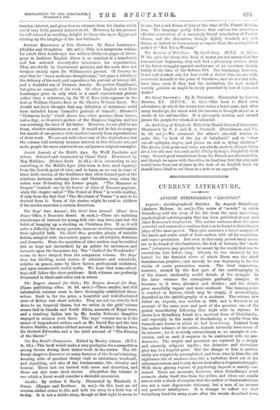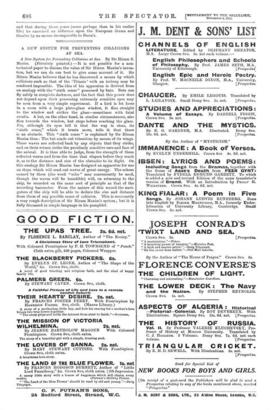CURRENT LITERATURE.
AUGUST STRINDBERG'S " LEGENDS."
Legends : Autobiographical Sketches. By August Strindberg. (Andrew Melrose. 6s. net.)—The series of "novels" in which Strindberg told the story of his life fornf the most interesting psychological autobiography that has been published at any rate since Rousseau's Confessions. The earlier volumes show the same powerful and remorseless realism that is to be found in Strindberg's plays of the same period. They give moreover a bitter analysis of the harsh and crude mind of their author, with all his scepticism and coarse pessimism. But even at this early period many traces are to be found of the fanaticism, the lack of balance, the " mad- ness" (whatever may precisely bo meant by the word) that was to overwhelm him before long. Already ho was obsessed by his hatred for the feminist views of which Ibsen was the chief Scandinavian prophet ; and already he was beginning to be the victim of acute persecution mania. The chief impression, however, created by the first part of the autobiography is of the almost intolerably sordid details of his struggle. In the later volumes the atmosphere gradually changes. It becomes, as it were, gloomier and thicker ; and the details grow mercifully vaguer and more confused. The turning-point is reached in Inferno, which may be simply, if misleadingly, described as the autobiography of a madman. The volume now before us, Legends, was written in 1898, and is devoted to an account of the same year and part of the previous one, of the period immediately following that dealt with in Inferno. It shows how Strindberg found in a mystical form of Christianity, and especially in the works of Swedenborg, a respite from the turmoil and horror in which he had been living. Isolated from the earlier volumes of the series, Legends naturally loses much of ita interest; for it is chiefly extraordinary as an example of con- version, and as such it requires to be contrasted with its pre- decessors. The sceptic and pessimist are replaced by a deeply and sincerely religious mystic ; the delusions and obsessions give way to a hopeful quiet. But the change in him is neither easily nor completely accomplished, and from time to time the old nightmare life of madness rises like a turbulent flood out of his subconsciousness, and is only driven back after a desperate struggle. With these gloomy regions of psychology Legends is mainly con- cerned. There are moments, however, when Strindberg's mind seems to shake itself free from the welter, and when one recalls almost with a shock of surprise that the author of these confessions was not a mere degenerate visionary, but a man of an intense and practical intelligence. It is strange to reflect too that 'Strindberg lived for many years after the events described here,
and that during those years (more perhaps than in his earlier life) he exercised an influence upon the European drama and theatre by no means incomparable to Ibsen's.



























































 Previous page
Previous page